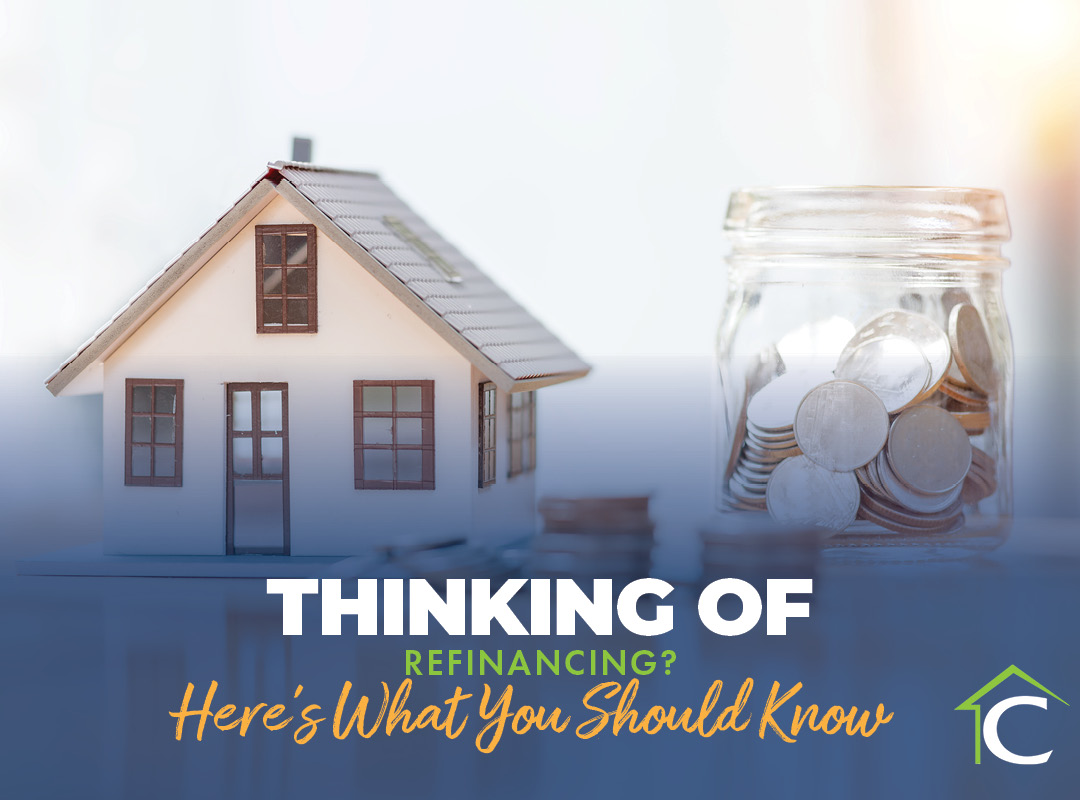Refinancing your mortgage offers various benefits, such as accessing home equity, lowering interest rates, reducing monthly payments, or adjusting the loan term to better fit your needs.
Refinancing your mortgage can give you a fresh financial start. When done at the right time, this homeownership maneuver can unlock the hidden value in your home's equity, grab a more favorable interest rate, slash your monthly payments, or even adjust the length of your loan to align perfectly with your life plans.
However, not every homeowner is automatically eligible for refinancing, nor is every moment the right time to embark on this process. What you need is a firm grasp of your financial standing, awareness of the market conditions, and a readiness to compile the required documents. As we delve into refinancing, we'll guide you through the essential knowledge and steps to take.
Reasons to Consider Refinancing
Refinancing your mortgage is a decision that can significantly impact your financial health and daily life. Here are the primary reasons homeowners choose to refinance:
- 1. Lower Monthly Payments or Interest Rates: Perhaps the most compelling reason to refinance is the opportunity to reduce your monthly mortgage payments. This is typically achieved by securing a lower interest rate than your current loan offers. A reduction in your interest rate decreases your monthly payments and can save you thousands of dollars over the life of your loan.
- 2. Switching from an Adjustable-Rate to a Fixed-Rate Mortgage: If your current mortgage is an adjustable-rate mortgage (ARM), you may face uncertainty regarding future payment amounts. Refinancing to a fixed-rate mortgage can provide stability by setting a consistent interest rate and monthly payment for the duration of your loan.
- 3. Accessing Cash for Home Repairs, Renovations, or Paying Down High-Interest Debt: A cash-out refinance allows you to tap into your home's equity, providing you with a lump sum of cash that can be used for home improvements, renovations, or to pay off high-interest debts like credit cards. This approach can consolidate your debt into a single, lower-interest payment and potentially increase your home's value through improvements.
Important note: Before making a decision, it’s wise to use online calculators designed to evaluate the benefits of refinancing. By entering details such as your current loan amount, home value, credit score, and more, these tools can offer a clearer picture of how your loan terms could change and what you might save in the long run.
Types of Refinance Options
The best route to refinancing depends on your unique circumstances and goals. Here’s a breakdown of the types of refinances and their key requirements:
| Conventional Refinance | FHA Refinance | FHA Streamline Refinance | VA Refinance | IRRRL | Jumbo Refinance | |
| Minimum Credit Score |
620 | 580 | 580 | 580 | 580 | 680 |
| Maximum DTI Ratio |
50% | Varies | Varies | 45% - 60% | 45% - 60% | 45% |
| Income Verification | Required | Required | Not Required | Required | Not Required | Required |
| Appraisal | Required | Required | Not Required | Required | Not Required | Required |
| Cost | Money for closing costs | Money for closing costs | Money for closing costs | Money for closing costs | Money for closing costs | Money for closing costs plus occasional cash reserves |
Conventional Refinance
- Minimum Credit Score: 620
- Maximum DTI Ratio: 50%
- Income Verification: Required
- Appraisal: Required
- Cost: Money for closing costs
A conventional refinance is a solid choice for those with a strong credit score looking to secure possibly lower interest rates and monthly payments. It's versatile but demands good financial standing.
Federal Housing Administration (FHA) Refinance
- Minimum Credit Score: 580
- Maximum DTI Ratio: Varies
- Income Verification: Required
- Appraisal: Required
- Cost: Money for closing costs
FHA refinance options are more flexible with credit scores and offer various terms, making them a good option for those with less-than-perfect credit.
FHA Streamline Refinance
- Minimum Credit Score: 580
- Maximum DTI Ratio: Varies
- Income Verification: Not required
- Appraisal: Not required
- Cost: Money for closing costs
This option simplifies the refinance process for existing FHA loan holders by reducing paperwork and waiving appraisal requirements, aiming for a quicker, less invasive process.
Department of Veterans Affairs (VA) Refinance
- Minimum Credit Score: 580
- Maximum DTI Ratio: 45% – 60%
- Income Verification: Required
- Appraisal: Required
- Cost: Money for closing costs
VA refinance loans are designed for service members, veterans, and eligible surviving spouses. They offer competitive terms but require a specific range of credit scores and DTI ratios.
VA Interest Rate Reduction Refinance Loan (IRRRL)
- Minimum Credit Score: 580
- Maximum DTI Ratio: 45% – 60%
- Income Verification: Not required
- Appraisal: Not required
- Cost: Money for closing costs
Also known as the VA Streamline Refinance, the IRRRL is aimed at existing VA loan holders looking to reduce their interest rate with minimal paperwork and no appraisal requirement.
Jumbo Refinance
- Minimum Credit Score: 680
- Maximum DTI Ratio: 45%
- Income Verification: Required
- Appraisal: Required
- Cost: Money for closing costs plus occasional cash reserves
Jumbo refinances cater to loans that exceed conventional loan limits, requiring higher credit scores and occasionally cash reserves on top of standard closing costs.
Eligibility for Refinancing
Before you dive into the process of refinancing your mortgage, gauge whether you meet the baseline qualifications required by lenders. This preliminary step gives you the necessary foundation necessary to be considered a viable candidate. From the length of time you've owned your home to your financial health, various factors play into your eligibility.
Title Ownership Duration
For cash-out refinancing, how long you've held the title to your property can be a deciding factor. Generally, you must have owned your home for a minimum period—often six months for jumbo loans or VA loans—before lenders will consider you for cash-out refinancing. Conventional or FHA cash-out refinancing typically requires a one-year waiting period. Borrowers must have a vested interest in the property and have begun accumulating equity that can be accessed through refinancing.
Exceptions to the Rule
There are notable exceptions to the title ownership duration requirement. For instance, if you're engaging in delayed financing, which allows you to pay cash for a property and then immediately take out a mortgage on it, the usual waiting period may not apply. Similarly, if you've inherited the property, different rules can fast-track your eligibility for refinancing, bypassing the standard ownership duration requirements.
Additional Requirements from Mortgage Lenders
Beyond the ownership duration, lenders may have other criteria that you'll need to meet to refinance your mortgage. These can include:
- Credit Score: Your credit score plays a significant role in refinancing eligibility. Lenders use it to assess your creditworthiness and the risk associated with offering you a loan.
- Debt-to-Income (DTI) Ratio: Lenders will look at your DTI ratio to determine your ability to manage monthly payments. A lower DTI ratio indicates a better balance between debt and income, making you a more attractive candidate for refinancing.
- Income Verification: You'll need to provide proof of income to verify that you can afford the new loan terms. This could be in the form of W-2s, tax returns, or pay stubs.
- Home Equity: The amount of equity you have in your home can affect your eligibility for refinancing, especially for cash-out refinance options. More equity means more borrowing power and often better loan terms.
Each lender may have its own set of requirements, so it's important to gather all relevant information and documents before applying.
Key Refinance Requirements
Refinancing your mortgage can provide numerous financial benefits, but it's not a one-size-fits-all solution. To navigate this process successfully, you'll need to meet certain requirements and understand how they influence your application. Here's a breakdown of the essential criteria:
Adequate Credit Score
Your credit score is a critical factor in refinancing. It not only affects your eligibility but also the interest rates you're offered. Higher scores typically lead to lower rates, making your loan more affordable over time. Before applying, it's wise to review your credit report and address any issues that could impact your score negatively.
Loan-Specific Credit Requirements
Conventional Loans typically require a minimum credit score of 620. Meeting this threshold shows lenders you have a responsible credit history. FHA Loans offer a bit more leniency with credit scores as low as 580 considered acceptable for refinancing. Some lenders might even accommodate lower scores under certain conditions. VA Loans also have a flexible approach towards credit scores, with many lenders looking for scores around 580. However, criteria can vary based on the lender and the specific circumstances of the borrower.
Substantial Home Equity
Equity—the portion of your home you truly "own"—plays a pivotal role in refinancing. For most refinancing options, particularly cash-out refinances, having substantial equity in your home is a big plus. Lenders typically prefer that you have at least 20 percent equity in your home. This signals that you have a significant stake in your property, which reduces the lender's risk.
DTI Ratio Considerations
Your Debt-to-Income (DTI) ratio is another important factor lenders examine. This ratio compares your total monthly debt payments to your gross monthly income. A lower DTI ratio suggests a good balance between debt and income, making you a more appealing candidate for refinancing. Most lenders prefer a DTI ratio of 40 percent or lower.
Understanding and Managing Closing Costs
Refinancing isn't free. You'll need to pay closing costs, which can include appraisal fees, title searches, application fees, and more. These costs typically range from 2 to 5 percent of the loan amount. Some lenders offer "no-cost" refinancing, but this usually means these costs are rolled into your loan, potentially increasing your interest rate or the loan amount.
Proof of Income and Necessary Documentation
Lenders will require proof of income to ensure you can afford the new loan. Be prepared to provide recent pay stubs, W-2s, tax returns, and any other documents that verify your income. For self-employed individuals, this might include profit and loss statements and additional tax documentation.
The Most Important Questions and Answers About Refinance Requirements
When refinancing your mortgage, you're bound to have questions. Understanding the nuances of the application process can make the difference between approval and denial.
Here are some frequently asked questions about refinance requirements:
What Are the Income Requirements for Refinancing?
Lenders need to verify that you have a stable and sufficient income to cover your new mortgage payments. While specific income requirements can vary by lender and loan type, you'll generally need to provide recent pay stubs, W-2 forms from the past two years, and tax returns if you're self-employed. The goal is to demonstrate a consistent income level that supports your ability to repay the loan.
What Might Disqualify Me from Refinancing?
Several factors could potentially disqualify you from refinancing your mortgage:
- Low Credit Score: Falling below the minimum credit score requirements for your desired loan type can be a deal-breaker.
- High Debt-to-Income (DTI) Ratio: If your DTI ratio exceeds the lender's maximum limit, it indicates that you may have trouble managing additional debt.
- Insufficient Home Equity: Not having enough equity in your home can prevent you from qualifying for certain types of refinancing, especially cash-out refinances.
- Late Mortgage Payments: A history of late payments on your current mortgage could raise concerns about your reliability as a borrower.
How Is Homeowners Insurance Verification Handled in the Refinancing Process?
Lenders require proof of homeowners insurance to protect their investment (your property) against damage or loss. During the refinancing process, you'll need to provide your lender with your current insurance policy details, including coverage amounts and the insurance company's contact information. The lender will verify that your policy meets their requirements and covers the full replacement cost of your home.
Do I Need Title Insurance When I Refinance?
Yes, you'll need to purchase a new lender's title insurance policy when you refinance. While your original owner's title insurance policy remains in effect for as long as you own the home, a lender's title insurance policy only covers the lifespan of a mortgage loan. Refinancing creates a new loan, necessitating a new policy to protect the lender against title issues such as liens, disputes, or undisclosed heirs that could affect ownership of the property.
Getting Ready To Refinance Your Mortgage
Refinancing your mortgage can be a savvy move that could bring down your interest rates, cut your monthly payments, let you draw on your home equity, or tweak your loan term to better fit where your life is at right now. These perks could shake up your financial status for the better, giving your budget some breathing room or helping you get a handle on debt.
Before you jump in, take a good look at where you stand financially. Do you know your credit score off the top of your head? How much of your home do you actually own versus owe? Are your debts in relation to your income at a good ratio? And have you got all your paperwork in order?
While refinancing isn't a magic bullet, it can change your financial situation, so long as you’re following the appropriate steps. So, consider what you’re hoping to achieve and reach out to a financial professional who can provide expert guidance and feedback. It's all about making sure refinancing fits into your bigger picture.

















